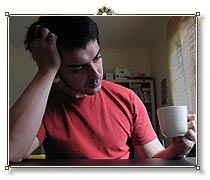 | ||||||
|
| ||||||
|
| ||||||
The Problem with Coffee, Caffeine...
Unfortunately the scenario often goes like this: The coffee drinker has a cup to "get going." A few hours later when the buzz wears off, they are left feeling even more depleted, so they pour another cup, then another, etc., and a vicious cycle begins. To make matters worse, it takes higher and higher caffeine levels to achieve a similar energy rush, and eventually the caffeine seems to barely affect us at all. At this point we have become addicted and must continue to drink coffee just to feel "okay". If we cut back, withdrawal symptoms ensue, including fatigue and headache. Drinking chai tea instead of coffee is one way to reduce your caffeine intake. High caffeine intake increases the levels of adrenal gland activity which can eventually lead to a state of chronic adrenal exhaustion. In a study of over 80,000 patients, heavy coffee consumption was linked to brittle bones (osteoporosis) - a reasonable finding since caffeine is known to leach calcium from the bones. It also causes the blood vessels to constrict and the heart to pump faster, worsening symptoms of hypertension and leading to high blood pressure. Caffeine may initially increase reaction time, but most scientists agree that caffeine actually worsens performance of complicated tasks, such as logical reasoning, complex numerical problems, fine motor coordination and accurate timing. A common beneficial claim is that caffeine is "good for headaches". While it is true that it temporarily increases the effectiveness of aspirin by as much as 40%, eventually, consistent higher doses of caffeine lose their effectiveness. In fact, high coffee intake is associated with more frequent headaches, not less. Another problem is insomnia. We all know that caffeine taken before bedtime causes restlessness and sleeplessness, and the higher the dose, the worse it is. However, a recent study sponsored by the National Institutes of Health showed that even a large amount of caffeine taken in the morning creates consistent stress throughout the day which can persist even through bedtime. Anyone with insomnia is well advised to reduce his/her caffeine intake. Caffeine is found in so many of the drinks and foods we consume today, it is nearly inescapable. But thankfully, small doses have not been shown to cause significant trouble for most people. To find out the specific amount of caffeine in any specific drink or food, visit the caffeine database. |
 As everyone knows, there is plenty of caffeine in coffee. Caffeine is a stimulant. As such, it offers the temporary benefits of
increased energy and alertness. But too much, for too long, is
troublesome. Caffeine is found in many foods and drinks, and moderation
is the key to avoiding problems. Drinking too much coffee is a common
problem many people have.
As everyone knows, there is plenty of caffeine in coffee. Caffeine is a stimulant. As such, it offers the temporary benefits of
increased energy and alertness. But too much, for too long, is
troublesome. Caffeine is found in many foods and drinks, and moderation
is the key to avoiding problems. Drinking too much coffee is a common
problem many people have.